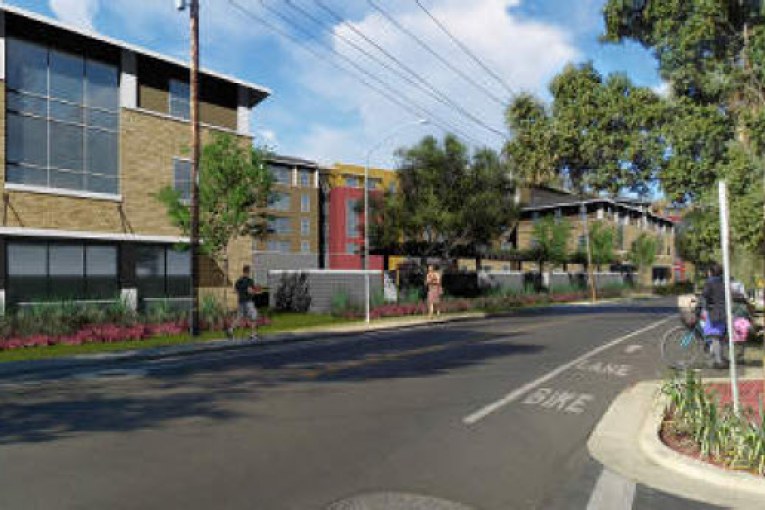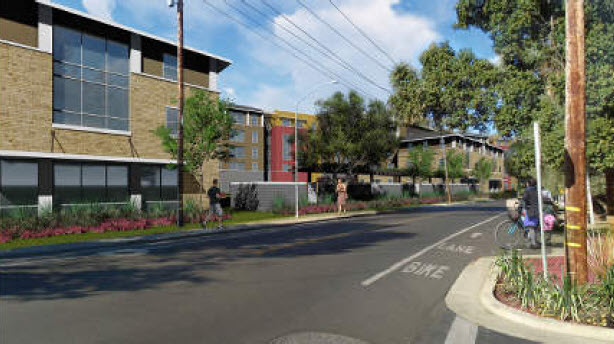

Coming out of closed session, Mayor Brett Lee announced the city had “filed a notice of appeal in the Trackside case.” He added that “the cost of the appeal will be borne by the Trackside applicants.”
A few minutes later the city attorney noted that the Lincoln40 decision, in which the city had prevailed in court, was appealed, however, the city and applicant filed a motion to dismiss that appeal “on the basis that it was untimely..”
She announced, “That was recently granted by the appeals court which went ahead and dismissed that appeal as untimely.”
The appeal was filed on June 21, 2019 – however, that missed the June 19 deadline by two days, two months after Judge Stephen Mock finalized his decision.
In a summary ruling, the court wrote: “Respondent’s motion to dismiss the appeal is granted. The appeal filed on June 21, 2019, is dismissed.”
In April, Judge Mock, two weeks after hearing oral arguments on his tentative ruling, issued a ruling that adopts the tentative ruling.
He wrote: “Having considered all matters submitted in the papers and on oral argument, the record of respondent’s proceedings in this matter, the file in this case, and the applicable law, the Court  adopts the tentative ruling.”
adopts the tentative ruling.”
He also ruled once again that the project was not exempt from “CEQA as a sustainable communities project.”
Meanwhile, in Trackside, in May, Judge Sam McAdam also stuck with his original ruling despite a strong push by attorneys for the city and real party of interest, Trackside, to get him to reconsider at a hearing in mid-April.
In a 22-page ruling by Judge McAdam, the Court stated, “Based on the totality of circumstances and a review of the entire record, it is the conclusion of this Court that Trackside is not consistent with the City of Davis planning provisions governing the transition between the Core Area and to the Old East Davis neighborhood.”
The ruling goes on to conclude that, while the City made “a compelling case” for a mixed-use, residential development, the Court believes that “the mass and scale of the project is not reasonable.”
As Judge McAdam put it, “the failure here is that the mass and scale of the proposed project is not reasonable under the current law and factual circumstances. There simply is not a logical and reasoned case to be made that Trackside is a ‘transition’ from the Core Area to the Old East Davis neighborhood. Trackside would overwhelm the existing residential neighborhood. It would not respect the traditional scale and character of the neighborhood. The record lacks evidentiary support for the City’s decision.”
The judge also stated that “it follows that the SB 375 Sustainable Community Environmental Assessment conducted by the City was inadequate.” Judge McAdam writes, “The SCEA/IS did not properly assess the project inconsistency with the General Plan and related planning provisions.”
As a result, the city was directed to rescind all approvals associated with the project.
—David M. Greenwald reporting


Wow – I’m shocked that the city is planning an appeal on Trackside.
By continuing to fight its own residents (and causing them additional time, expense, and hassle), I’m wondering if this might ultimately “break the camel’s back”, regarding the current makeup of the council.
I guess we’ll see.
From their perspective, the case was wrongly decided by the trial court. They may be getting additional guidance and pressure from the League of Cities or other state/ regional organizations. Besides, how is this different than Lincoln40 and Nishi? They have a process and the litigation goes outside of that process – they would be foolish to back down under legal threat.
It’s different than Lincoln40 and Nishi in that a judge has already rendered a decision, regarding Trackside. It is not a legal “threat” in that they’ve already lost, once. The city didn’t like that legal outcome.
With Trackside, it’s also a lot more “personal” and is in residents’ “backyard”. Seems to have generated significant opposition from an entire neighborhood, and may have already been a contributing factor regarding the candidates for the last council race.
Actions such as this might also signal to others that the current council is willing to do whatever it takes to try to force its decisions on other neighborhoods, as well. And, that it’s willing to pit developer money (to pay for court cases), against those of residents’ money.
(I understand that in the case of Lincoln 40, the city also partially lost that decision as well – regarding the need for an EIR.)
I don’t think they view it that way – the view it as a mistake by the judge. We’ll see what happens.
They didn’t partially lose in the Lincoln40 case because they did an EIR. They didn’t agree with the judge there either, but their abundance of caution paid off.
Funny, how some view losing legal decisions as a “mistake” by a judge, but view victories as “vindication”. It takes a certain amount of arrogance to adopt such views.
Although I’m sorry that the neighbors will have to expend additional resources to defend the legal decision, I suspect that the city’s decision might ultimately backfire politically – possibly resulting in better outcomes in the future.
That is, unless one believes that actions such as this are limited to Trackside.
Regarding Lincoln40, I understand that the city put forth legal arguments that the development was exempt from CEQA, and that the judge ruled against that argument.
That’s why we have an appellate process. You do realize that the judge was probably the least knowledgable person in the room when it comes to landuse issues and law. That doesn’t necessarily mean he’s wrong, but just a point there.
Judges are the “least knowledgeable”, regarding the law?
And, the city is hoping that the next judge is “more knowledgeable”, regarding the law?
Could have sworn I just noted something about “arrogance”, in my previous comment.
He’s in the room with people that are experts on land use law – he’s not. I’ve seen judges actually have to ask lawyers for the law and cites, because they are not experts on that specific law and have to get up to speed.
Apparently, the city’s “process” now includes instigation its own legal actions.
That’s not what I was referring to. The city’s entitlement process. Once it goes to the legal realm, it exits that process and enters a different one.
If they’re relying upon experts, they use that information to make decisions. And, when some don’t like the outcome, they attack the ability of the judge to make such decisions. Sometimes, this even occurs on political blogs, by non-attorneys (let alone, non-experts).
Sometimes, council members themselves don’t have a great deal of knowledge regarding land use law. Regardless, they’re not the ultimate authority, when decisions are appealed.
And now, the city is engaging in its own appeal.
I think it is accurate to state that it generated significant opposition from a dedicated group of property owners, but I doubt very much that the same degree of opposition extends to the tenants, who are likely in the majority in the neighborhood (as they are throughout the City).
This is a surprisingly naive statement. It’s not the role of judges to be the most knowledgeable person in the room. It’s up to the lawyers, through the presentation of evidence—including lay and expert testimony—and legal briefs—to educate the judge on the relevant facts and law. And even the most knowledgeable people in the room may have differing opinions on how the law applies to the facts of a given case. That’s why we have lawsuits and judges.
Just my impression after watching him in hearing and reading his decision. We’ll see what the appellate court thinkgs.
To the best of my recollection, all of the participants in the Trackside issue are Davis residents. The project is, or was, a consortium of local resident investors. The opponents are as well.
Two of the candidates last time around appeared to have been motivated initially by this project. They didn’t win. I think most people in the city don’t care about it. I’d bet one of them would have won a district election. But one vote on the council doesn’t translate into a majority.
Are you? Just like in a badly-written Hollywood monster-vampire-zombie flick, you have to kill the object of evil three times before it is truly dead. The trick is not to open the closet door . . .
We have only killed Trackside once, so far . . .
One down, two to go. Bring it on, zombies!
Technically they have yet to kill it once. They have an injunction against it going forward, but it is not dead… yet.
And in horror flicks, the object of evil isn’t truly dead, either. Do you know the term, “metaphor”?